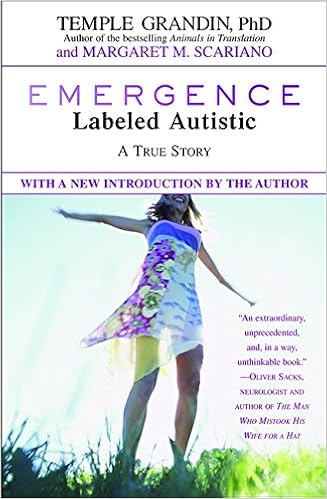Showing posts with label Faith. Show all posts
Showing posts with label Faith. Show all posts
Saturday, July 23, 2016
Wednesday, May 25, 2016
Wednesday, March 23, 2016
Faith, Autism and Taking Things Literally

I have been reading Temple Grandin's Emergence: Labelled Autistic. In one of the chapters, Temple shares about an experience in chapel at the boarding school she attended as a child. I will share a portion here to give you some insight in the challenges of communicating spiritual truths to people with autism.
"I am the door: by me if any man enter in, he shall be saved." The minister stepped out from behind the lecturn and stood in front of the congregation. He said, "Before each of you there is a door opening into heaven. Open it and be saved." He turned and walked back to the lecturn. "Hymn 306, 'Bless This House.'"
I barely heard the hymn number. Like many autistic children, everything was literal to me. My mind centered on one thing. Door. A door opening to heaven. A door through which I could pass and be saved! The voices sang out and when I heard the words, "Bless this door that it may prove/Ever open to joy and love," I knew I had to find that door.
For the next few days I viewed each door as a possible opening to love and joy. The closet door, the bathroom door, the front door, the stable door-all were scrutinized and rejected as the door.
I share all this to say that much care must be used in sharing spiritual concepts with those who tend to take things literally.
Monday, March 14, 2016
What the Church Needs to Know About Autism - Episode 2
In this episode of "What the Church Needs to Know About Autism," I encourage churches to eliminate the words "retard" and "retarded" from their vocabulary. What seems like an innocent word to some is devastating to others.
Friday, March 11, 2016
What the Church Needs to Know About Autism - Episode 1
The first in a series of videos looking at what the church needs to know about autism. In this episode I talk about the diversity within the autism spectrum disorder.
Labels:
Autism,
Church,
Faith,
Video,
What the Church Needs to Know About Autism
Thursday, February 4, 2016
Friday, December 11, 2015
Tuesday, September 29, 2015
My Autism and My Faith
I have heard from some people with autism that faith can be difficult. I have also heard from parents concerned about how to explain Christian faith to their child with autism. I have blogged previously about autism and faith. What I would like to do now is just talk about my own experience.
How can I as a person with autism hold on to such an abstract thing as faith in an invisible God?
What I need to make clear is that I do not have a blind faith. Some people can be just told the Jesus story and feel such an emotional connection that they instantly believe. That is not be.
I believe because I see that there is evidence for Christianity. Between the historical evidence for Jesus and my experience of answered prayers, I am forced to go where the evidence leads. It is not the emotional faith that many of my friends have but it is just as real.
Even as a church-goer, I was always annoying to my friends. While they would automatically accept what was said from the pulpit (even if it contradicted the guest speaker from the previous week), I would notice the biblical and logical mistakes. To some it looked like I lacked faith, whereas I felt it was the faith God wanted me to have.
I continue to be a skeptic in many ways. While I am a Christian and a pastor, I do not automatically believe everything I hear. I want to see the evidence and I am okay with that.
My autism does not prevent me from having faith, rather it pushes me to have a more reliable faith.
If you are interested in my reflections on Christian evidence, you find my other blog here.
How can I as a person with autism hold on to such an abstract thing as faith in an invisible God?
What I need to make clear is that I do not have a blind faith. Some people can be just told the Jesus story and feel such an emotional connection that they instantly believe. That is not be.
I believe because I see that there is evidence for Christianity. Between the historical evidence for Jesus and my experience of answered prayers, I am forced to go where the evidence leads. It is not the emotional faith that many of my friends have but it is just as real.
Even as a church-goer, I was always annoying to my friends. While they would automatically accept what was said from the pulpit (even if it contradicted the guest speaker from the previous week), I would notice the biblical and logical mistakes. To some it looked like I lacked faith, whereas I felt it was the faith God wanted me to have.
I continue to be a skeptic in many ways. While I am a Christian and a pastor, I do not automatically believe everything I hear. I want to see the evidence and I am okay with that.
My autism does not prevent me from having faith, rather it pushes me to have a more reliable faith.
If you are interested in my reflections on Christian evidence, you find my other blog here.
Sunday, August 30, 2015
5 Things You Need to Know About Faith and Autism
One of the most common questions I get is about how people with autism understand faith. At first I tried to guess from my children with autism, which is hard because they are both nonverbal. Now that I have been diagnosed with autism myself, I have a bit more insight.
Here are five things to take into account.
1. Every person with autism is different. This will make every list about autism. I am sharing some generalizations but saying "all people with autism are..." is as difficult as saying "all people without autism are..." So take the rest of the list as only things that I have observed.
2. Try to be concrete in your explanations. Jesus in your heart really does not help people with autism very much. In fact, you might as well get rid of all Christianese. Be a follower of Jesus is an example of a concrete image. It makes sense.
3. Some doctrines are easier than others. For myself, Heaven is hard to get my head around. But the resurrection of the dead (which the Bible emphasizes much more anyway) makes sense.
4. People with autism are vulnerable to legalism. Many with autism think in terms of rules. If a church has a set of unhealthy and unbiblical rules, this can be damaging to the faith.
5. Apologetics may play a role. Why am I interested in apologetics? I was studying apologetics long before I ever considered autism. Apologetics makes sense to me. It helps to see the faith in a reasonable and rational way. Don't dismiss apologetics because you don't find it helpful.
Here are five things to take into account.
1. Every person with autism is different. This will make every list about autism. I am sharing some generalizations but saying "all people with autism are..." is as difficult as saying "all people without autism are..." So take the rest of the list as only things that I have observed.
2. Try to be concrete in your explanations. Jesus in your heart really does not help people with autism very much. In fact, you might as well get rid of all Christianese. Be a follower of Jesus is an example of a concrete image. It makes sense.
3. Some doctrines are easier than others. For myself, Heaven is hard to get my head around. But the resurrection of the dead (which the Bible emphasizes much more anyway) makes sense.
4. People with autism are vulnerable to legalism. Many with autism think in terms of rules. If a church has a set of unhealthy and unbiblical rules, this can be damaging to the faith.
5. Apologetics may play a role. Why am I interested in apologetics? I was studying apologetics long before I ever considered autism. Apologetics makes sense to me. It helps to see the faith in a reasonable and rational way. Don't dismiss apologetics because you don't find it helpful.
Subscribe to:
Posts (Atom)


